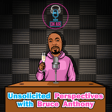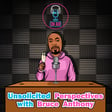
Dr. Marion Orr on the Hidden Legacy of Charles C. Diggs Jr.
A lot of us learned about Rosa, Malcolm, King… but not Charles C. Diggs Jr. — and that’s a problem. In this episode of Unsolicited Perspectives with Bruce Anthony, we sit down with Dr. Marion Orr, author of House of Diggs, to unpack the life of the man who helped found the Congressional Black Caucus, showed up at the Emmett Till trial when no other federal official did, fought for DC home rule, and pushed the U.S. toward an anti-apartheid stance when presidents were still cozy with South Africa. This is Black political history at work — the kind that explains how we got Black flight attendants, Black committee chairs, and Black mayors in the nation’s capital.
Dr. Orr breaks down Diggs’ journey from Detroit to Congress, why representation on TV mattered to him as a kid, how HBCU professors shaped a whole generation of Black political scientists, and yes — we even talk about the scandal that ended Diggs’ career and why it shouldn’t erase his legacy.
If you’re into civil rights, congressional power, Black leadership, or you’ve ever said “how did I NEVER learn this?” — this episode is for you. 👉 Listen, like, comment, and SHARE — especially with folks in DC, historians, and CBC stans. 👉 Pick up House of Diggs to go deeper. #CharlesDiggs #BlackPoliticalHistory #congressionalblackcaucus #americanhistory #CivilRightsLegacy #unsolicitedperspectives
🔔 Hit that subscribe and notification button for weekly content that bridges the past to the future with passion and perspective. Thumbs up if we’re hitting the right notes! Let’s get the conversation rolling—drop a comment and let’s chat about today’s topics.
🚨 Get access to the Uncensored conversations — raw, unfiltered, and unapologetically bold.
💥 Tap in for exclusive episodes, spicy extras, and behind-the-scenes chaos you won’t find anywhere else:
🔓 Unlock it on YouTube Memberships: https://www.youtube.com/channel/UCL4HuzYPchKvoajwR9MLxSQ/join
💸 Back us on Patreon: patreon.com/unsolicitedperspectives
Thank you for tuning into Unsolicited Perspectives with Bruce Anthony. Let's continue the conversation in the comments and remember, stay engaged, stay informed, and always keep an open mind. See you in the next episode!
#podcast #mentalhealth #relationships #currentevents #popculture #fyp #trending #SocialCommentary
Chapters:
00:00 Meet the Man Who Changed Black Politics Forever 🎙️🔥📚
00:19 Welcome to Unsolicited Perspectives 🎙️🔥
00:47 Why Charles Diggs Jr. Matters—A Conversation with Dr. Orr 🏛️💬🌟
03:14 From Savannah Streets to Political Science Dreams 🌟📖✊
05:44 The Professor Who Created Black Politics as a Field 🎓💡🖤
09:28 When Representation Changes Everything 👀📺⚡
11:10 The Power of Being Called 'Doctor' at an HBCU 🎯🏛️💪
12:59 Discovering Charles Diggs: The Forgotten Giant 🕵️📜🔍
16:46 Home Rule: When Congress Controlled Black DC 🏛️⚖️😤
21:23 Emmett Till's Trial: The Congressman Who Showed Up 💔⚖️✊
26:01 Courage Under Jim Crow: Five Days in Mississippi 😨🔥🎭
29:21 South Africa: The Fight That Defined His Legacy 🌍✊🔥
33:46 Fighting Apartheid When Presidents Wouldn't 💥🌍⚔️
36:23 Nixon's Enemy List and the Birth of the CBC 📋👁️💣
40:07 The Real Founder of the Congressional Black Caucus 🏛️👊🖤
44:40 The Scandal That Ended a Giant's Career 💸⚖️😔
48:08 His Fingerprints Are Everywhere You Look Today ✈️🏛️👀
58:22 Why We Can't Afford to Forget Charles Diggs 📖💔🔥
01:00:16 The Cost and Courage of Black Leadership in America 🎯✊🌟
Follow the Audio Podcast: On all Audio Platforms
Beat Provided By https://freebeats.io Produced By White Hot

